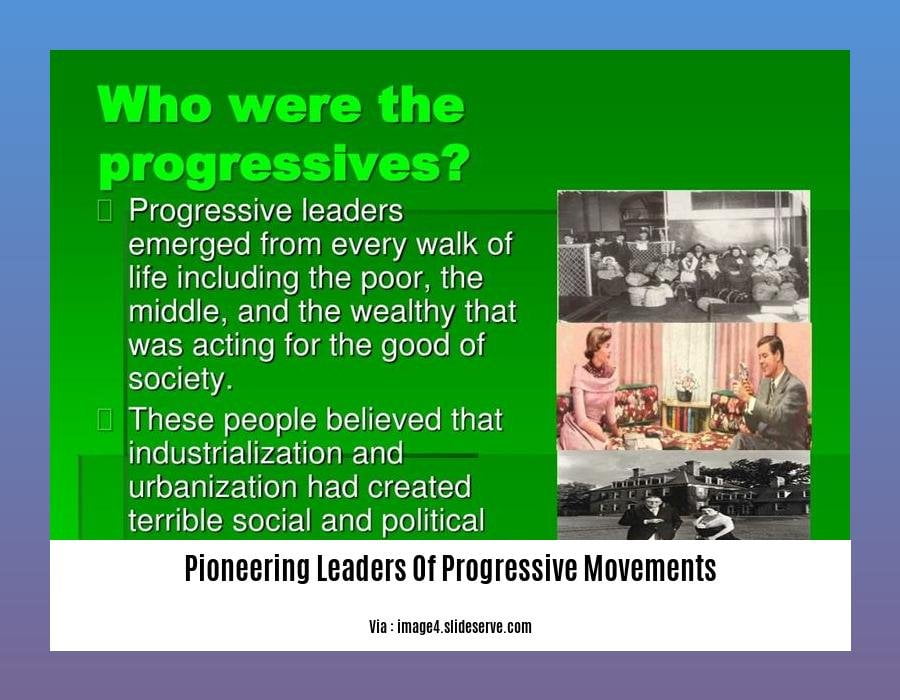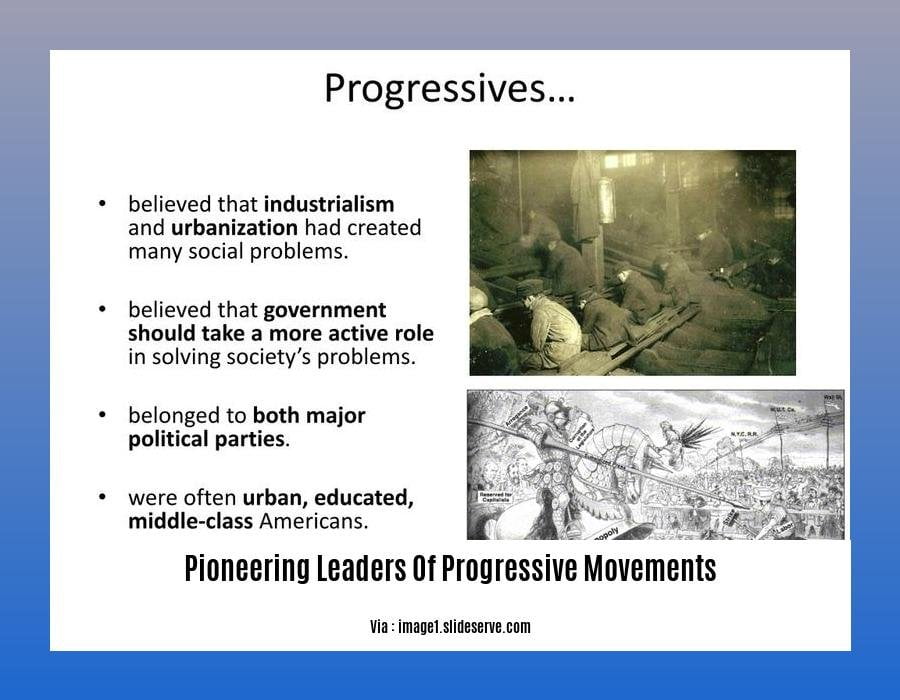The Pioneering Leaders of Progressive Movements: Inspiring Change and Building a More Equitable World. This piece explores the remarkable journeys of those who challenge the status quo and build a more just and equitable world.

Key Takeaways:
- The Progressive Movement (1890s-1920s) sought social, political, and cultural reforms in the United States.
- Notable leaders like Eugene Debs, Jane Addams, and Florence Kelley advocated for government strengthening and addressing the needs of the people.
- Progressive Era reforms included women’s suffrage, anti-monopoly laws, elimination of child labor, and social welfare programs.
Pioneering Leaders of Progressive Movements
Who are the pioneering leaders of progressive movements?
The pioneering leaders of progressive movements were a diverse group of individuals who shared a common goal of creating a more just and equitable society. They came from all walks of life, but they were united by their belief that the status quo was not acceptable and that change was necessary.
What were their motivations?
The motivations of the pioneering leaders of progressive movements varied, but they all shared a deep concern for the plight of the poor and working class. They saw firsthand the injustices that were rampant in society, and they were determined to do something about it.
What were their challenges?
The pioneering leaders of progressive movements faced many challenges in their work. They were often met with resistance from those who benefited from the status quo. They were also criticized for being too radical or unrealistic.
What were their achievements?
Despite the challenges they faced, the pioneering leaders of progressive movements achieved a great deal. They helped to pass laws that protected workers, improved the lives of the poor, and expanded access to education and healthcare. They also helped to raise awareness of social justice issues and inspire a new generation of activists.
What is their legacy?
The legacy of the pioneering leaders of progressive movements is still felt today. Their work helped to create a more just and equitable society, and their ideals continue to inspire activists and policymakers around the world.
Notable Pioneering Leaders of Progressive Movements:
- Eugene Debs: A labor leader and socialist who ran for president five times.
- Jane Addams: A social worker and peace activist who founded Hull House, a settlement house that provided services to the poor in Chicago.
- Louis Brandeis: A Supreme Court Justice who was a leading advocate for social justice.
- Florence Kelley: A labor reformer who fought for laws to protect women and children in the workplace.
- John Dewey: A philosopher and educational reformer who advocated for progressive education methods.
These are just a few of the many pioneering leaders of progressive movements who have made a lasting impact on the world. Their work is a testament to the power of one person to make a difference.
Meet the famous leaders of social and political reform movements, who dedicated their lives to fighting for justice and equality. From the greatest social reformers in history to the influential leaders of reform and change, these individuals have made significant contributions to shaping our world.
Intersectionality and Marginalized Voices
Intersectionality is a framework that examines how different identities intersect and overlap, creating unique experiences of oppression and privilege. It emerged from the collaboration between social movements and academia, offering a more nuanced understanding of social movements by considering the power dynamics and inclusion/exclusion of marginalized groups.
Intersectionality is crucial not only for social movements on the left but also for movements addressing issues faced by women, working-class, and racialized communities. By recognizing and addressing intersectionality, social movements can build stronger and more inclusive coalitions.
Successful social movements have adopted an intersectional approach. For instance, the civil rights movement fought for the rights of African Americans, but it also addressed issues of gender and class. The women’s suffrage movement, originally focused on white women, expanded to include women of color through the efforts of suffragists like Ida B. Wells-Barnett.
Key Takeaways:
- Intersectionality provides a more nuanced understanding of social movements by considering the experiences of marginalized groups.
- Intersectionality is important for movements beyond the left, such as those addressing issues faced by women, working-class, and racialized communities.
- By recognizing and addressing intersectionality, social movements can build stronger and more inclusive coalitions.
Citation:
– Intersectionality and social movements: Intersectional challenges and intersecting solidarities
Impact and Legacy
The Progressive Era reform movement left an impact on the lives of millions of Americans, particularly the working class, immigrants, and the poor. Progressive reformers championed causes such as labor rights, consumer protection, and expanded access to education and healthcare. They successfully passed laws that improved working conditions, protected consumers from fraud, and expanded access to education and healthcare.
The legacy of the Progressive Era is still felt today. Many of the laws passed during this time remain in place and continue to protect workers, consumers, and the environment. The Progressive Era also gave rise to new social movements and organizations that continue to fight for justice and equality.
Key Takeaways:
- Progressive reformers championed causes such as labor rights, consumer protection, and expanded access to education and healthcare.
- Many of the laws passed during the Progressive Era remain in place and continue to protect workers, consumers, and the environment.
- The Progressive Era gave rise to new social movements and organizations that continue to fight for justice and equality.
Citation:
The Progressive Era | Key Facts















